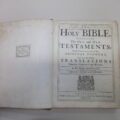Compiled by Trisha Bleau Smith
 Taken from Nelson’s Bible Dictionary:
Taken from Nelson’s Bible Dictionary:
The authority of the Bible follows naturally from its inspiration. It is implied by its title, “the Word of God.” It is written record of the Word of God that came to prophets, apostles, and other spokesmen, and that “became flesh” in Jesus Christ. Christians believe Jesus Christ was teh Word of God in a unique sense. Through Jesus, God communicated His perfect revelation of HImself to mankind (Heb. 1:1-3). For Christians the authority of the Bible is related to the authority of Christ. The Old Testament was the Bible that Jesus used — the authority to which He made constant appeal and whose teachings He followed and proclaimed. When Jesus was arrested in teh Garden of Gethsemane and led away to His execution, He submitted with the words, “The Scriptures must be fulfilled” (Mark 14:49). He saw His mission in the world as a fulfillment of the predictions of the Old Testament.
The New Testament presents the record of Jesus’ life, teachings, death, and resurrection; a narrative of the beginning of the Christian church with the coming of the Holy Spirit; and the story of the extension of the gospel and the planting of the church during the following generation. It also contains the written teachings of Jesus’ apostles and other early Christians who applied the principles of His teaching and redemptive work to their lives.
I am also including something from the beginning of the Lost Books of the Bible. I thought this intro to be interesting, since I judged the rejected books after reading them, ignoring what was said in the introduction. I automatically said “How could they market this book in a Christian store??” without even remembering the intro I read. Here is part of it:
The great things in this world are growths. This applies to books as well as to institutions. The Bible is a growth. Many people do not understand that it is not a book written by a single person, but it is a library of several books which were composed by various people in various countries. It is interesting to know how this library grew and upon what principle some books were accepted and some rejected.
Of course we may take people’s word for the reasons why certain books were chosen, BUT IT IS ALWAYS SATISFACTORY TO COME TO OUR OWN CONCLUSIONS BY EXAMINING OUR OWN EVIDENCE. (caps mine)
This is what this Lost Books of the Bible enables us to do. We can examine the books of the Scriptures which we have in the authorized version, and then in this book we can read those scriptures which have been eliminated by various councils in order to make up our standard Bible. It is safe to say that a comparison of the accepted books with those rejected may be relied upon, for those books which were accepted are far superior in value to the others. These others which are included in the Lost Books of the Bible comprise all kinds of stories, tales and myths.
No greater figure than Christ appears in history without myths growing up about him. Every great personage becomes a nucleus or center about which folk tales cluster.
But what about the books that were left out? This question has the wrong perpective on the issue. No other books were ever accepted and there is no reason to believe that most of them were even in the running. For both the Old and New Testaments there are certain books that were accepted by everyone, some books that were later disputed, and some that were rejected by all. There is no category of books initially accepted and later thrown out. There are, however, two groups of books that many are saying should have been included. These are the Apocrypha and the Gnostic gospels.
Okay, time for my opinion now. I do not believe the Apocrypha and the Gnostic gospels or any other psuedopigraphia need to be included in the Bible. God does not make mistakes. If those were inspired and authoritative works they would have been included. When the canon was formed He would have made sure that those were considered to be authoritative enough to include. But He did not, therefore I believe they do not belong in the Bible then.
Like the guy from the Lost Books of the Bible said in his intro – you can learn a lot from reading historical writings. But you make the decision based on what God is showing you, whether or not they are the Word of God. Yes they can be inspirational, but that does not mean it is the Word of God in Scripture. Look at all of the writings out there now. Everyone who is any good at writing tries to pen their own view point or recreate the story from a different perspective. That doesn’t make them any more Scripture than those that people are debating should be included in the Bible. I think it is all interesting to read, but I don’t gain anything from it except maybe some inpiration and edification. I still turn to the Bible because I KNOW it is the Word of God and will always stand as such.





Be the first to comment